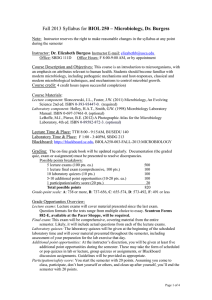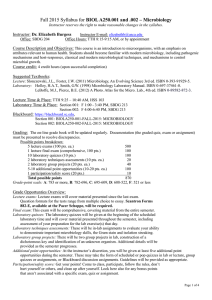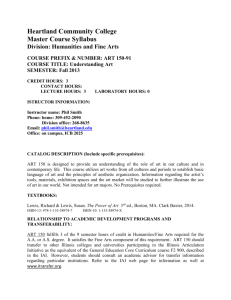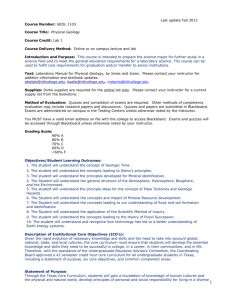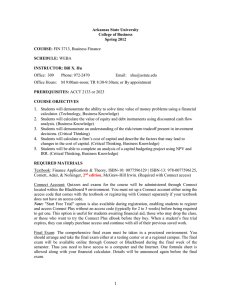ABIO 250.001 – Microbiology, Dr. Burgess Note:
advertisement
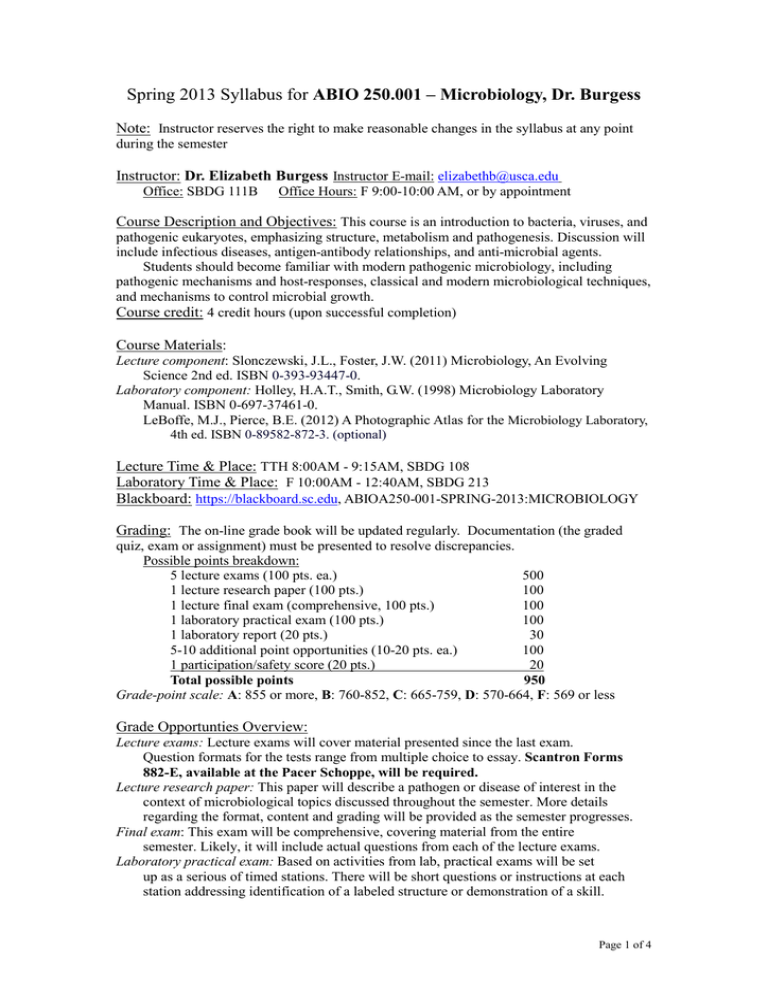
Spring 2013 Syllabus for ABIO 250.001 – Microbiology, Dr. Burgess Note: Instructor reserves the right to make reasonable changes in the syllabus at any point during the semester Instructor: Dr. Elizabeth Burgess Instructor E-mail: elizabethb@usca.edu Office: SBDG 111B Office Hours: F 9:00-10:00 AM, or by appointment Course Description and Objectives: This course is an introduction to bacteria, viruses, and pathogenic eukaryotes, emphasizing structure, metabolism and pathogenesis. Discussion will include infectious diseases, antigen-antibody relationships, and anti-microbial agents. Students should become familiar with modern pathogenic microbiology, including pathogenic mechanisms and host-responses, classical and modern microbiological techniques, and mechanisms to control microbial growth. Course credit: 4 credit hours (upon successful completion) Course Materials: Lecture component: Slonczewski, J.L., Foster, J.W. (2011) Microbiology, An Evolving Science 2nd ed. ISBN 0-393-93447-0. Laboratory component: Holley, H.A.T., Smith, G.W. (1998) Microbiology Laboratory Manual. ISBN 0-697-37461-0. LeBoffe, M.J., Pierce, B.E. (2012) A Photographic Atlas for the Microbiology Laboratory, 4th ed. ISBN 0-89582-872-3. (optional) Lecture Time & Place: TTH 8:00AM - 9:15AM, SBDG 108 Laboratory Time & Place: F 10:00AM - 12:40AM, SBDG 213 Blackboard: https://blackboard.sc.edu, ABIOA250-001-SPRING-2013:MICROBIOLOGY Grading: The on-line grade book will be updated regularly. Documentation (the graded quiz, exam or assignment) must be presented to resolve discrepancies. Possible points breakdown: 5 lecture exams (100 pts. ea.) 500 1 lecture research paper (100 pts.) 100 1 lecture final exam (comprehensive, 100 pts.) 100 1 laboratory practical exam (100 pts.) 100 1 laboratory report (20 pts.) 30 5-10 additional point opportunities (10-20 pts. ea.) 100 1 participation/safety score (20 pts.) 20 Total possible points 950 Grade-point scale: A: 855 or more, B: 760-852, C: 665-759, D: 570-664, F: 569 or less Grade Opportunties Overview: Lecture exams: Lecture exams will cover material presented since the last exam. Question formats for the tests range from multiple choice to essay. Scantron Forms 882-E, available at the Pacer Schoppe, will be required. Lecture research paper: This paper will describe a pathogen or disease of interest in the context of microbiological topics discussed throughout the semester. More details regarding the format, content and grading will be provided as the semester progresses. Final exam: This exam will be comprehensive, covering material from the entire semester. Likely, it will include actual questions from each of the lecture exams. Laboratory practical exam: Based on activities from lab, practical exams will be set up as a serious of timed stations. There will be short questions or instructions at each station addressing identification of a labeled structure or demonstration of a skill. Page 1 of 4 Laboratory report: The laboratory report will describe an isolated organism. More details regarding the format, content and grading will be provided as the semester progresses. Additional point opportunities: At the instructor’s discretion, you will be given at least five additional point opportunities during the semester. These may take the form of scheduled or pop quizzes in lab or lecture, laboratory group quizzes or assignments, or Blackboard discussion assignments. Guidelines will be provided as appropriate. Participation/safety score: You start the semester with 20 points. Assuming you come to class, participate, don’t hurt yourself or others, and clean up after yourself, you’ll end the semester with 20 points. Attendance and Punctuality: Poor attendance will negatively affect both your Participation and Safety score and your overall grade. Good attendance will give you the opportunity to hear the lectures, ask questions, participate in laboratory exercises and learn the material on a first-hand basis, which will improve your overall grade. Exams and quizzes given at the beginning of the lecture or laboratory period will start promptly at the scheduled time. Extra time will not be given for a late arrival. There will be no make-up lecture exams or quizzes except under extreme circumstances as deemed acceptable by the instructor on an individual basis. There will be absolutely no make-ups for missed laboratory exercises, quizzes, or practical exams. Tutoring: Tutoring services are available through the Academic Success Center on campus. The center employs experts trained to help students develop good study habits based on individual needs and skills. See http://www.usca.edu/asc for more information. Disability Statement: If you have a physical, psychological, and/or learning disability which might affect your performance in this class, please contact the Office of Disability Services, 134 B&E, (803) 643-6816, as soon as possible. The Disability Services Office will determine appropriate accommodations based on medical documentation. Honor Code: Students are expected to abide by the Academic Code of Conduct as described in the Student Handbook on every exam and assignment. “On my honor as a University of South Carolina at Aiken student, I have neither given nor received any unauthorized aid on this assignment / examination. To the best of my knowledge, I am not in violation of academic honesty.” Appropriate disciplinary action will be taken if academic integrity is violated. Respect and Policy for Portable Electronic Devices: The instructor expects you to participate in this course in a respectful manner. This includes using complete sentences in correspondence and SILENCING distracting electronic devices before entering the classroom or laboratory. Disruptive behavior will not be tolerated. The instructor reserves the right to dismiss disrespectful students during lecture or lab, or to block their participation in on-line discussions. There will be no make-ups of missed material. The use of any portable electronic devices during class is not allowed for any reason unless prior approval has been given to the student from the instructor or unless required for the course. If you use a portable electronic device during a test, quiz, or other assessment, you are eligible to receive a failing grade on that assignment. Additional Advice: Microbiology is a very time-consuming course, and it will require study time outside of regularly scheduled class time. Work with your lab partners and study in groups, use the Student Q&A Discussion Board. Quizzing someone else can help you learn or you might gain insight from someone else’s explanation of a difficult concept. Don’t hesitate to ask questions about things you don’t understand. Make flash cards to help you remember difficult terms. Set aside time each week to review lecture and laboratory material; do not wait until the night before an exam to study. New material will build on the foundation you establish with previous material. If you are serious about your career, put in the time required Page 2 of 4 to be successful. Lecture Topic Outline Topic No. Lecture Topic Text Chs. 1 Introduction, History, Chemistry 1, A1 2 Non-Clinical Considerations 16, 22 EXAM 1 (Topics 1-2) 3 Microscopy 2 4 Structure and Classification 3, 6, A2, 1820 EXAM 2 (Topics 3-4) 5 Metabolism 13-15 6 Genetics 7-12 EXAM 3 (Topics 5-6) 7 Growth 4 8 Control 5, 27 EXAM 4 (Topics 7-8) 9 Epidemiology 28 10 Pathogenesis/Virulence 25 11 Host Defenses/Immunity 23-24 EXAM 5 (Topics 9-11) 11 Bug Parade 26 RESEARCH PAPER FINAL EXAM (All Topics) Lecture Schedule: The PowerPoint files for each Lecture Topic will be posted on Blackboard, grouped by exam. Content for exams will come primarily from what is presented in class; the textbook is a supplement to this material. The exams will be scheduled based on the amount of time required to get through the lecture topics associated with each. As the semester progresses, the exam schedule will be updated on the Blackboard calendar. The final exam is scheduled according to the USCA Final Examinations Schedule. For this course, the final exam will be Tuesday, May 7 at 8:00 AM. Page 3 of 4 Laboratory Outline Date Laboratory Exercises 1/18 A-aseptic Technique, Microscopy 1/25 Culture Characteristics, Culture Transfers 2/1 Slide Preparation and Staining 2/8 Growth Curve Analysis 2/15 Quantification 2/22 Control 3/1 LAB PRACTICAL 3/8 Dental Microbiology 3/22 Body Flora 3/29 Environmental Isolation 4/5 Identification of Unknown 4/12 Characterization of Unknown 4/19 Characterization of Unknown con’t 4/26 LAB REPORT Laboratory Schedule: Relevant information not covered in the lab manual for each Laboratory Exercise will be posted on Blackboard. Many of the exercises will require you to work in the lab outside of the regularly scheduled lab time. You should be able to access the laboratory 24/7. Maintain regular communication with your instructor and the laboratory assistants to request necessary supplies in a timely manner. Laboratory Safety: This course requires handling of live microbiological cultures. A lab coat or oversized, button-up shirt and close-toed shoes are required. Do not eat or drink in the laboratory at any time. Long hair and bangs must be pulled back or tied up. Keep workspace clean. Thoroughly wash hands before and after lab work. Additional details will be provided during the first laboratory meeting. Failure to practice laboratory safety will negatively affect your Participation and Safety score. Blackboard: Familiarity with Blackboard will be essential for this course. If you are having trouble accessing Blackboard, get help as soon as possible by contacting University Technology Services (http://uts.sc.edu/academic/blackboard/index.shtml, 803-777-1800, or servicedesk@sc.edu). Page 4 of 4
